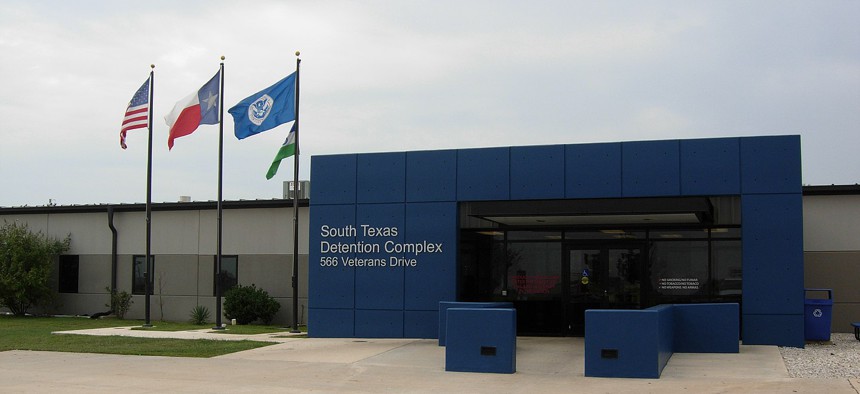
Wikimedia Commons
Reps. Sylvia Garcia, Joaquin Castro Call on ICE to Release Migrants in Immigration Detention Centers as Coronavirus Cases Surge
As cases surge in Texas and the pandemic rages on, the representatives said ICE should release all detainees who are not a safety risk and who are more vulnerable to contracting the virus.
Reps. Joaquin Castro, D-San Antonio, and Sylvia Garcia, D-Houston, called on Immigration and Customs Enforcement on Monday to release detainees at risk of catching the new coronavirus and to increase testing at its facilities.
The Texas lawmakers, in a call with reporters Monday, described a pair of immigration detention centers as prison-like after they visited the South Texas ICE Processing Center in Pearsall and the South Texas Family Residential Center in Dilley.
As cases surge in Texas and the pandemic rages on, the representatives said ICE should release all detainees who are not a safety risk and who are more vulnerable to contracting the virus.
“The conditions are bad. These people are living in a petri dish,” said Castro, chairman of the Congressional Hispanic Caucus, which hosted the call.
In late April, the U.S. District Court for the Central District of California directed ICE to release minors to the custody of their parents or guardians as long as they are not viewed as a flight risk or danger to themselves, an ICE official said in a written statement. ICE did not comment on whether it would release any other groups of people.
Across the nation, detention centers have become hot spots for the coronavirus, putting immigrant families and ICE officers at risk of contracting the virus.
Last month, the GEO Group — which runs the immigration detention center in Pearsall — came under fire for a lack of transparency in its efforts to prevent the spread of the coronavirus within its facilities and the outside community. In early May, the immigration detention center was linked to more than 90% of Frio County’s confirmed COVID-19 cases.
“ICE barely lifts a finger to make sure that these folks are safe,” Castro said.
Unlike other hot spots like nursing homes and prisons, ICE has yet to conduct comprehensive testing for staff and detainees, nor does it have a directive to do so from the White House, Castro said. One of the detention centers has a rapid COVID-19 testing machine, but it’s constantly passed around among centers, Castro said. He argued that by now, the immigration detention centers should each have at least one machine so they can test detainees, ICE employees and anyone else who enters the facility.
“The conditions are terrible for these folks,” Castro said, adding that ICE isn’t “doing their job and are doing a disservice to their employees and to the people who are detained and imprisoned at these facilities by not taking proper medical precautions.”
As of Monday, the South Texas ICE Processing Center in Pearsall was at 30% bed capacity, and the South Texas Family Residential Center in Dilley was at 7% bed capacity, an ICE official said in a statement. Testing is done on a case-by-case basis.
“ICE demonstrated today with the Hispanic Caucus that the agency’s top priority is to provide the health, welfare and safety of the residents and detainees in custody," an ICE official said in a written statement.
Garcia said she’s not convinced recommended health protocols are being followed within the detention centers, though ICE employees told her they were.
While detainees wore cloth masks, Garcia said, they were mostly crowded in rooms where they couldn’t practice social distancing. The detainees she spoke with told her the masks weren’t distributed until about two weeks ago, ahead of the the visit, and that mask mandates are rarely enforced for detainees or staff, she said.
“Even if half of it is true, it’s still not a good scenario because it looks like it was window dressing for our visit,” Garcia said.
This article originally appeared in The Texas Tribune at https://www.texastribune.org/2020/06/22/syvlia-garcia-joaquin-castro-coronavirus-ice/.
The Texas Tribune is proud to celebrate 10 years of exceptional journalism for an exceptional state. Explore the next 10 years with us.






